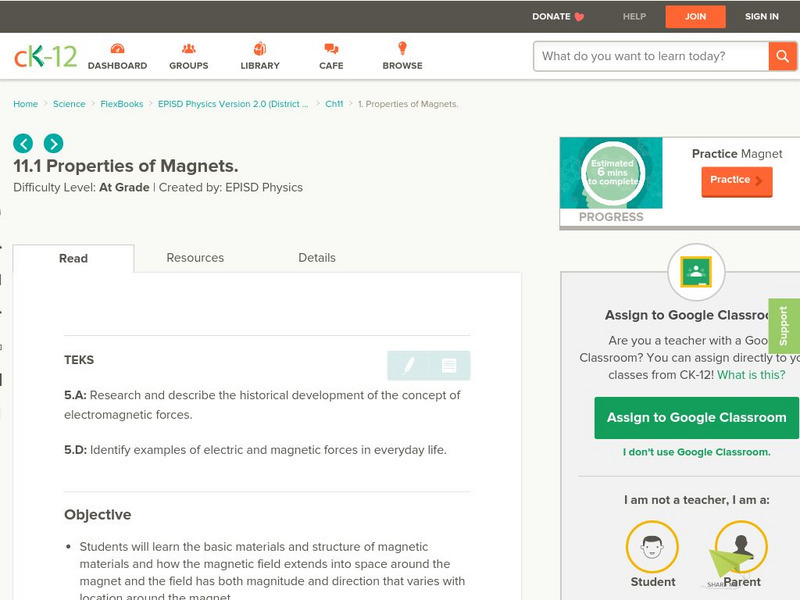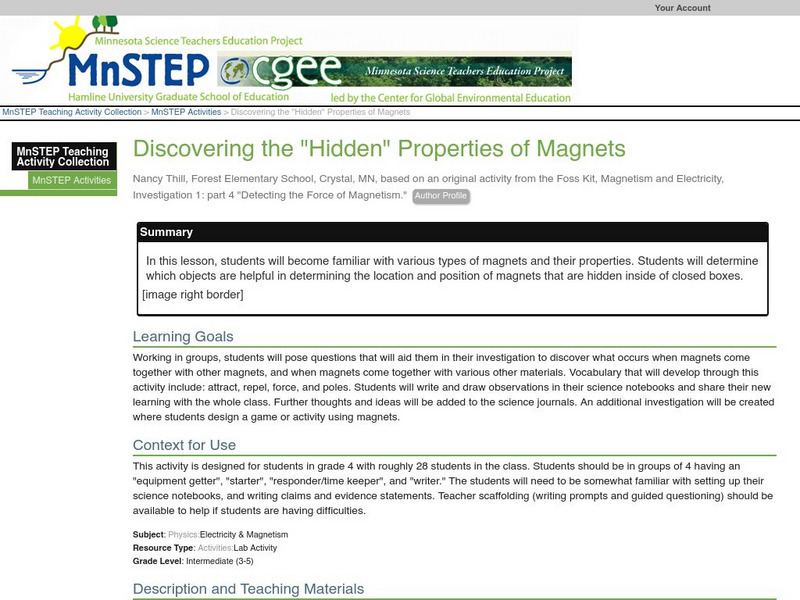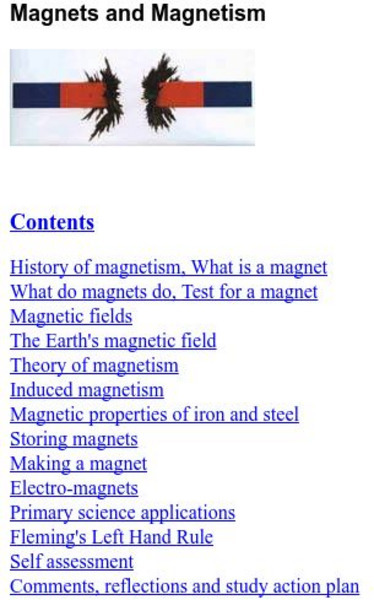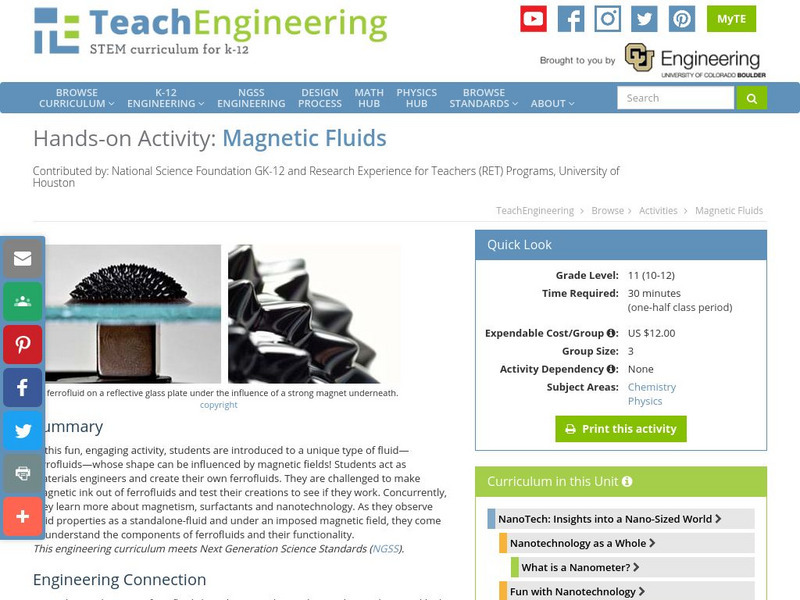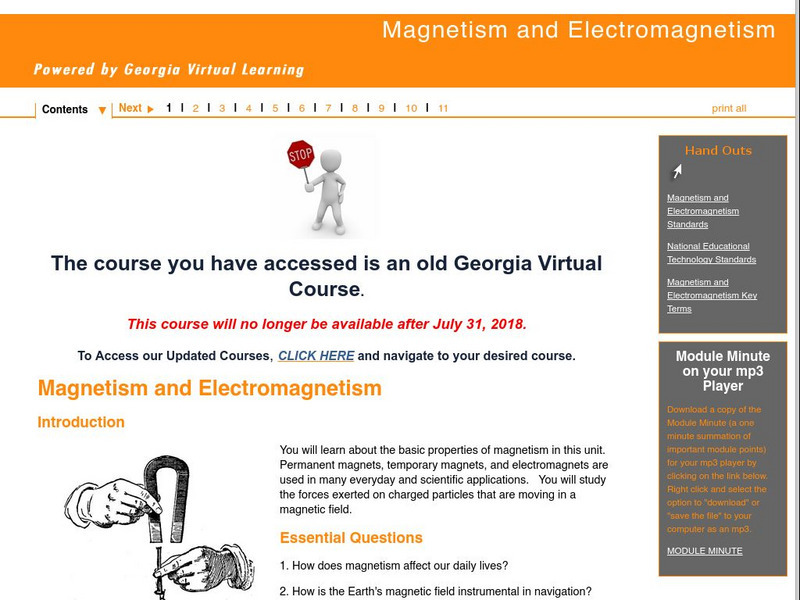Curated OER
What Shape Is It?
Young scholars predict the shape of an unknown object by bouncing a ball on it. In this physics lesson, students relate this activity to how dolphins use echo-location to navigate. They analyze their lab result and discuss findings.
Curated OER
Simple Circuits
Students investigate how series and parallel circuits work. In this physics lesson, students build their own simple circuits and compare their characteristics. They explain the importance of circuit breakers in household circuits.
Georgia State University
Georgia State University: Hyper Physics: Magnetic Properties of Solids
This site from the Georgia State University contains a good overview of some of the magnetic properties that are common to all materials, such as susceptibility and permeability, and then specific discussion of both diamagnetic and...
Georgia Department of Education
Ga Virtual Learning: Forces on Moving Charges in Magnetic Fields
In this interactive tutorial students will explore magnetic force. Students will observe interactions of magnets and study magnetic fields. The source of magnetic properties is believed to be moving charge. Since moving charge produces...
Alabama Learning Exchange
Alex: The Magnetic Maglev Train
This is a hands-on, inquiry-based lesson that includes three magnetic stations in which students or small groups rotate in order to test and discover different magnetic properties and then use their knowledge to build a Maglev Train...
National High Magnetic Field Laboratory
Magnet Academy: Felix Bloch (1905 1983)
Physicist Felix Bloch developed a non-destructive technique for precisely observing and measuring the magnetic properties of nuclear particles. He called his technique "nuclear induction," but nuclear magnetic resonance (NMR) soon became...
Exploratorium
Exploratorium: Science Snacks: Magnetic Fruit: Push Me a Grape
An online activity which illustrates the magnetic property of diamagnetism associated with water. Contains a simple procedure and then a good explanation of the magnetic interactions that were displayed by the grapes.
National High Magnetic Field Laboratory
Magnet Academy: Diamagnetism and Paramagnetism
Think iron, nickel and other "ferromagnetic" substances are the only ones with magnetic properties? In fact, everything reacts to magnetic fields in some way.
TeachEngineering
Teach Engineering: Magnetic or Not?
Students explore the basic magnetic properties of different substances, particularly aluminum and steel. There is a common misconception that magnets attract all metals, largely due to the ubiquity of steel in metal products. The...
Other
Integrated Magnetics: Magnet Frequently Asked Questions
Answers to many Frequently Asked Questions on magnets and magnetism.
TeachEngineering
Teach Engineering: Magnetic Attraction
Students complete a series of six short investigations involving magnets to learn more about their properties. Students also discuss engineering uses for magnets and brainstorm examples of magnets in use in their everyday lives.
TeachEngineering
Teach Engineering: Magic Magnetic Fluid
Students are introduced to a unique fluid--ferrofluids--the shape of which can be influenced by magnetic fields. This activity supplements traditional magnetism activities and offers comparisons between large-scale materials and...
Other
Mineralogical Society of America: Mineral Identification Key: Mineral Properties
Scientists classify minerals based on a set of physical properties. Each of these properties is described in detail.
National High Magnetic Field Laboratory
Magnet Academy: Edward Purcell
Edward Mills Purcell was an American physicist who received half of the 1952 Nobel Prize for Physics for his development of a new method of ascertaining the magnetic properties of atomic nuclei. Known as nuclear magnetic resonance...
Other
All About Circuits: Magnetism and Electromagnetism: Permanent Magnets
A good explanation of what the property of magnetism is and how it occurs naturally in lodestone and can be generated in metals such as steel. It describes how a ferromagnetic material such as iron becomes magnetized when near a...
E-learning for Kids
E Learning for Kids: Science: Alexandrian Lighthouse: What Are Properties of Magnets?
Learn about the properties of magnets, what metals are attracted to them, what magnetic poles do, and about repulsion and attraction.
CK-12 Foundation
Ck 12: Properties of Magnets
[Free Registration/Login may be required to access all resource tools.] Looks at magnetic materials and the structure and breadth of a magnetic field. The concept of magnetic domains is explained, and how they behave in a magnetic field....
CK-12 Foundation
Ck 12: Fifth Grade Science: Physical Science: Magnets and Magnetism
[Free Registration/Login may be required to access all resource tools.] Looks at the properties of magnets and why some materials are magnetic.
Science Education Resource Center at Carleton College
Serc: Discovering the Hidden Properties of Magnets
In this lesson plan, students determine which objects are helpful in determining the location and position of magnets that are hidden inside of closed boxes.
Other
Sc Icentre: Magnets and Magnetism
Gives a simple description of the theory of magnetism and the properties of a magnet. Very good descriptions for beginning level.
CK-12 Foundation
Ck 12: Third Grade Science: Physical Science: Magnets
[Free Registration/Login may be required to access all resource tools.] Looks at the properties of magnets and explains why some materials are magnetic and how magnets can cause change without touching another object.
TeachEngineering
Teach Engineering: Magnetic Fluids
In this fun, engaging activity, students are introduced to a unique type of fluid--ferrofluids--whose shape can be influenced by magnetic fields! Students act as materials engineers and create their own ferrofluids. They are challenged...
Georgia Department of Education
Ga Virtual Learning: Magnetism and Electromagnetism
In this interactive learning module, students learn about the basic properties of magnetism. Practice problems are provided for ongoing assessment.
American Chemical Society
American Chemical Society: Science for Kids: Characteristics of Materials
Engaging hands-on science lessons for grades 2-6 on the properties of different materials.


















